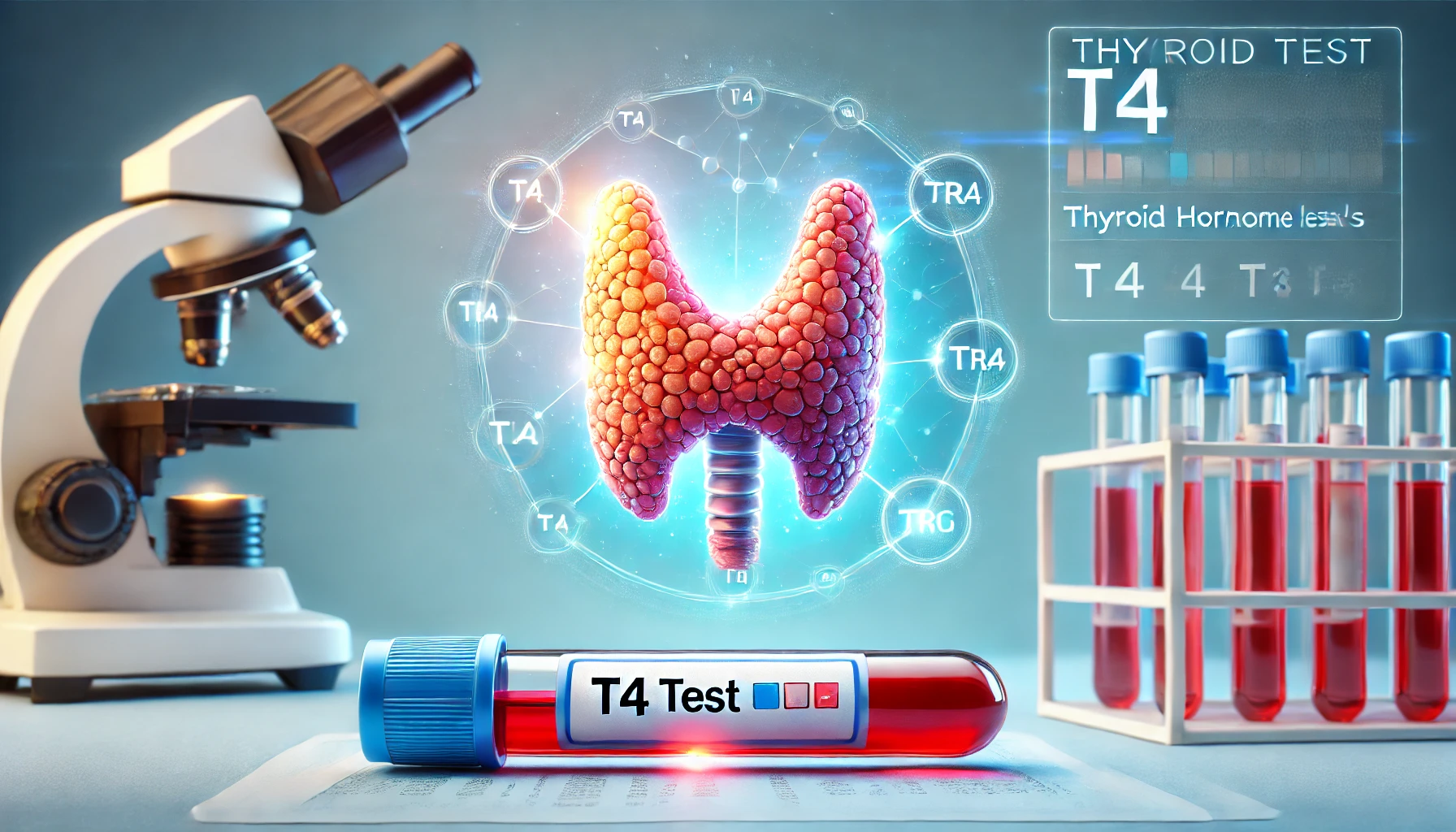Overview of the Test
The T4 (Thyroxine) test is a medical laboratory test used to measure the levels of thyroxine in the blood. This test helps evaluate thyroid function and is commonly ordered to diagnose and monitor thyroid disorders, such as hypothyroidism and hyperthyroidism. T4 plays a vital role in regulating metabolism, energy production, and overall body function. It is often conducted alongside T3 (Triiodothyronine) and TSH (Thyroid-Stimulating Hormone) tests to provide a complete picture of thyroid health.

Function of T4 in the Human Body
Thyroxine (T4) is one of the main hormones produced by the thyroid gland. It circulates in the bloodstream in two forms:
- Bound T4: Attached to proteins and inactive.
- Free T4 (FT4): Unbound and biologically active.
T4 is essential for:
- Regulating metabolic rate and energy levels
- Maintaining heart and brain function
- Supporting growth and development
- Influencing digestion and temperature regulation
- Ensuring proper muscle and bone maintenance
Uses of the T4 Test in Medical Laboratory
The T4 test is used to:
- Diagnose and monitor hypothyroidism (underactive thyroid) and hyperthyroidism (overactive thyroid)
- Assess thyroid hormone therapy effectiveness
- Investigate causes of unexplained weight changes, fatigue, or mood disorders
- Evaluate thyroid function in pregnancy
- Identify thyroid disorders related to pituitary gland dysfunction
Reasons for Ordering the Test
Healthcare providers may recommend a T4 test for patients with symptoms such as:
- Hyperthyroidism symptoms: Unexplained weight loss, rapid heartbeat, anxiety, excessive sweating, tremors, and increased appetite.
- Hypothyroidism symptoms: Fatigue, weight gain, depression, dry skin, cold intolerance, and slowed metabolism.
- Goiter or thyroid nodules.
- Menstrual irregularities or infertility issues.
- Abnormal TSH or T3 levels requiring further investigation.
- Routine screening during pregnancy.
Test Procedure and Method
- Sample Required: A blood sample is drawn from a vein in the arm.
- Laboratory Analysis: The blood sample is tested using immunoassay techniques such as enzyme-linked immunosorbent assay (ELISA) or radioimmunoassay (RIA) to measure total T4 and free T4 levels.
Preparation and Guidelines
- Fasting is not usually required, but patients should follow their doctor’s instructions.
- Some medications, such as thyroid hormone therapy, steroids, and birth control pills, may influence test results and should be discussed with a healthcare provider.
- Avoid high biotin supplements before testing, as they can interfere with results.
Interpreting Results
Reference Ranges:
- Total T4: 5.0–12.0 µg/dL
- Free T4 (FT4): 0.8–1.8 ng/dL
Possible Deviations:
- Elevated T4 Levels: May indicate hyperthyroidism, Graves’ disease, thyroid nodules, or thyroid hormone resistance.
- Low T4 Levels: May suggest hypothyroidism, iodine deficiency, chronic illness, or pituitary gland disorders.
Clinical Implications and Next Steps
- If T4 levels are high, treatment may involve antithyroid medications, radioactive iodine therapy, or thyroid surgery.
- If T4 levels are low, thyroid hormone replacement therapy (e.g., levothyroxine) may be recommended.
- Additional tests, such as TSH, Free T3, thyroid ultrasound, or radioactive iodine uptake tests, may be necessary to confirm a diagnosis.
Frequently Asked Questions
- Is the T4 test accurate?
- Yes, but it should be interpreted in conjunction with TSH and T3 tests for a complete assessment.
- Are there any risks associated with the test?
- Minimal risks include mild pain, bruising, or dizziness from blood withdrawal.
- How long do results take?
- Typically, within 24–48 hours.
- Does diet affect T4 levels?
- Yes, iodine intake and severe malnutrition can influence thyroid function.
Final Thoughts and Recommendations
The T4 test is a critical tool for diagnosing and managing thyroid disorders. Understanding test results in consultation with a healthcare provider ensures accurate diagnosis, treatment planning, and ongoing monitoring of thyroid health. Always discuss test outcomes with a medical professional to determine appropriate next steps.
